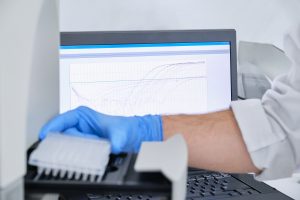24 Dec What does the emergence of new SARS-CoV-2 variants mean for testing?
What does the emergence of new SARS-CoV-2 variants mean for testing?
The UK has recently been at the centre of considerable media attention due to the detection of a large number of COVID-19 cases caused by a new variant of the viral pathogen. This new SARS-CoV-2 variant, has been the subject of particular interest because it is associated with higher transmission rates. It has also been cited as the primary reason for introducing tighter restrictions over Christmas, a period usually accompanied by lots of indoor mixing between households, perfect conditions for the virus to circulate. Additionally, many countries have closed their borders to travellers from the UK in an attempt to limit the spread of the new variant on a global scale.
The ‘UK variant.’
The new SARS-CoV-2 variant was initially detected by a mass genomic surveillance programme run by the COVID-19 Genomics UK Consortium (COG-UK), which collects, sequences, and analyses SARS-CoV-2 samples from patients across the UK. COG-UK initially detected the new variant – called VUI-202012/01, or lineage B.1.1.7 – in October, from a sample collected in September. This variant is responsible for an increasing proportion of COVID-19 cases in the UK, particularly in the South East of England.
Mutations in the SARS-CoV-2 genome are expected as part of normal evolution. Researchers estimate that there have been 4,000 mutations in the spike protein alone, the part of the viral particle responsible for gaining entry to human cells. The new UK variant is defined by 23 mutations: 13-non synonymous mutations, 4 deletions and 6 synonymous mutations1. Some of these sequence changes are present in the spike protein.
What are the concerns?
Mutations do not automatically make a virus more dangerous. However, potential causes for concern include how mutations affect disease severity, rate of spread, vaccine efficacy, and testing measures.
The novel variant, which has been identified as VUI-202012/01, has spread rapidly within the UK. PHE has assessed this variant as having substantially increased transmissibility with high confidence.
Currently, there is no evidence to suggest that the new variant causes more severe disease. Further studies are underway to characterise the variant and updates will be provided.
How is testing affected by new variants?
A prominent concern is whether current testing platforms can detect new variants with sufficient sensitivity and specificity. Novacyt has an advanced bioinformatic surveillance platform to ensure our testing keeps up with the evolution of new variants of the virus. This monitoring involves careful tracking of mutations in SARS-CoV-2 sequences uploaded to public databases by researchers worldwide.
Through this programme, we have examined almost 200,000 sequences, and confirmed that our gold standard tests maintained a 100% detection profile for the new variant. View our latest report here.
Final Remarks
Genomic surveillance has been an essential part of the fight against the novel coronavirus. The gargantuan effort to quickly identify new variants through mass testing, data sharing, and bioinformatic analysis is a testament to scientific advancement. Monitoring the emergence of new variants as the pandemic evolves will be essential to enable the best treatment and prevention strategies.
References
- Public Health England: Investigation of novel SARS-COV-2 variant Variant of Concern 202012/01: https://assets.publishing.service.gov.uk/government/uploads/system/uploads/attachment_data/file/947048/Technical_Briefing_VOC_SH_NJL2_SH2.pdf


